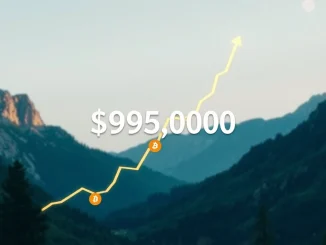
The world of digital assets is constantly evolving, and a groundbreaking development has just rocked the market: the REX-Osprey Solana + Staking ETF (SSK) has not only integrated JitoSOL, a leading liquid staking token, but has also remarkably surpassed $100 million in assets under management (AUM). This milestone marks the SSK as the first U.S. ETF to deliver crypto staking rewards, signaling a monumental shift in how traditional investors can access the lucrative world of decentralized finance. For anyone interested in the convergence of blockchain innovation and mainstream finance, this Solana ETF is a game-changer.
REX-Osprey’s Bold Move: The Genesis of the Solana ETF
Launched on July 2, 2025, the REX-Osprey Solana + Staking ETF (SSK) was designed with a clear vision: to bridge the gap between traditional brokerage platforms and the dynamic world of crypto-asset allocation. This pioneering Solana ETF offers investors direct exposure to Solana’s native staking rewards within a familiar, regulated ETF structure. The rapid accumulation of over $100 million in AUM in just a few weeks underscores a surging demand for accessible and compliant crypto investment vehicles.
Greg King, CEO of REX Financial and Osprey Funds, emphasized the SSK’s unique position, stating that it’s the first U.S. ETF to offer crypto staking rewards. This isn’t just about offering exposure to Solana; it’s about providing a pathway for investors to earn yield from a blockchain network without the complexities of direct staking. The SSK aims to combine the yield advantages of staking with the liquidity and transparency that traditional investors expect from an ETF.
Unlocking Potential with JitoSOL Staking: Why Liquidity Matters
The strategic integration of JitoSOL, a prominent liquid staking token within the Solana ecosystem, is a pivotal development for the SSK. But what exactly is JitoSOL and why is its inclusion so significant for a staking ETF?
JitoSOL represents staked SOL tokens, but unlike traditional staking where your assets are locked, JitoSOL allows investors to maintain liquidity. This means you can still trade or use your staked assets in other DeFi protocols while continuing to earn staking rewards. This innovation addresses a critical challenge in traditional staking models: illiquidity.
The benefits of incorporating JitoSOL into the SSK are manifold:
- Enhanced Liquidity: Investors in the SSK can indirectly benefit from the liquidity provided by JitoSOL, allowing for easier entry and exit from positions without sacrificing potential staking rewards.
- Optimized Yield: JitoSOL is designed to maximize staking yields on Solana by participating in MEV (Maximal Extractable Value) strategies, potentially offering better returns.
- Increased Capital Efficiency: By allowing staked assets to remain tradable, the SSK provides a more capital-efficient way for investors to gain exposure to Solana’s yield.
- Reduced Complexity: The ETF structure simplifies participation in liquid staking, removing the need for investors to manage wallets, private keys, or interact directly with DeFi protocols.
This move aligns with broader trends in the crypto market, where Liquid Staking Tokens (LSTs) are increasingly seen as a crucial innovation for unlocking capital efficiency and broadening access to staking yields. For the SSK, JitoSOL’s inclusion further optimizes liquidity while preserving Solana’s inherent yield advantages, making it an even more attractive proposition for both institutional and retail investors.
Why Crypto Staking Rewards Matter to Mainstream Investors
The concept of earning passive income from digital assets, or Crypto Staking Rewards, has long been a major draw in the decentralized finance (DeFi) space. However, direct participation often involves technical hurdles and security concerns that deter many traditional investors. The REX-Osprey Solana ETF changes this narrative entirely.
By packaging staking rewards within a regulated ETF, SSK provides a familiar and secure gateway for investors seeking yield from their crypto allocations. The rapid growth to over $100 million in AUM since its July 2nd launch vividly illustrates the pent-up demand for such products. Investors are clearly eager to participate in blockchain-based income streams, provided they can do so through their existing brokerage accounts and with the oversight of traditional financial regulations.
Here’s a brief comparison illustrating the appeal:
| Feature | Traditional Staking (Direct) | Liquid Staking via SSK ETF |
|---|---|---|
| Asset Lock-up | Assets often locked for a period | Indirect exposure, no direct lock-up for investor |
| Liquidity | Low during lock-up period | High (ETF shares are tradable) |
| Technical Complexity | High (wallet setup, node selection, gas fees) | Low (buy shares via brokerage) |
| Security Risk | Slashing, smart contract bugs, wallet hacks | Managed by professional fund, regulated |
| Yield Source | Direct network rewards | Network rewards passed through ETF |
| Regulatory Oversight | Minimal to none | Significant (SEC, FINRA, etc.) |
This simplified access to staking yields, combined with regulatory compliance, is expected to accelerate mainstream adoption of crypto assets. Analysts believe that products like the SSK are crucial for bridging the gap between the nascent crypto economy and the established financial system, offering a clear path for large-scale capital deployment.
Navigating the Future of Digital Asset Management
The success of the REX-Osprey Solana ETF and its innovative approach to Digital Asset Management signals a significant shift in the investment landscape. It demonstrates that institutional investors are increasingly looking beyond mere price speculation and are seeking ways to integrate blockchain-native income streams into diversified portfolios.
The strategic partnership between REX-Osprey and the Solana ecosystem highlights Solana’s growing appeal to institutional capital. Solana’s high-performance blockchain, known for its speed and low transaction costs, combined with robust liquid staking solutions like JitoSOL, offers a compelling value proposition for ETFs aiming to deliver both yield and tradability.
However, the journey isn’t without its considerations. While the SSK offers transparency—a critical factor in building trust among traditional investors wary of crypto’s volatility—its long-term success will depend on several factors:
- Sustained Demand for Staking Yields: The attractiveness of staking rewards needs to remain high relative to other investment opportunities.
- Solana Network Stability and Scalability: The underlying Solana blockchain must continue to demonstrate security, reliability, and the ability to scale under increasing adoption.
- Regulatory Evolution: The evolving regulatory landscape for crypto assets will continue to shape the development and acceptance of such products.
This pioneering ETF serves as a blueprint for future digital asset products, paving the way for more sophisticated and integrated financial instruments that combine the best of blockchain innovation with traditional finance’s stability and regulatory frameworks.
Solana’s Strategic Role in DeFi Innovation
Solana’s architecture, designed for high throughput and low latency, positions it as a prime candidate for institutional-grade financial products. Its robust ecosystem, featuring a growing array of DeFi protocols, NFTs, and dApps, provides the fertile ground for innovations like JitoSOL. The network’s ability to handle a massive volume of transactions efficiently makes it an attractive foundation for financial instruments that require speed and reliability.
The decision by REX-Osprey to focus on Solana for their inaugural staking ETF is a testament to the network’s technical prowess and its potential for long-term growth. As more institutional players eye the crypto space, Solana’s performance and developer-friendly environment are likely to continue attracting significant investment and innovation.
Conclusion
The REX-Osprey Solana + Staking ETF’s rapid ascent past $100 million AUM, bolstered by its strategic integration of JitoSOL, marks a pivotal moment for the crypto market. As the first U.S. ETF to offer crypto staking rewards, it significantly lowers the barrier to entry for traditional investors, allowing them to access the lucrative yields of decentralized finance through a regulated, familiar vehicle. This development not only validates the growing institutional interest in Solana but also sets a powerful precedent for the future of digital asset management. It underscores a clear trend: the merging of blockchain innovation with mainstream finance is not just a possibility, but a rapidly unfolding reality, promising greater accessibility and sophistication for investors worldwide.
Frequently Asked Questions (FAQs)
What is the REX-Osprey Solana + Staking ETF (SSK)?
The SSK is the first U.S. Exchange Traded Fund (ETF) designed to provide investors with exposure to Solana (SOL) and its native staking rewards. It allows traditional investors to gain exposure to crypto yield without directly managing digital assets or engaging in complex staking processes.
How does JitoSOL enhance the Solana ETF?
JitoSOL is a liquid staking token on the Solana network. Its integration into the SSK allows the ETF to maintain liquidity while still participating in Solana’s staking rewards. This means the underlying staked assets can remain tradable, offering a more capital-efficient way to earn yield compared to traditional, locked staking.
What does it mean for an ETF to surpass $100 million in AUM?
Surpassing $100 million in Assets Under Management (AUM) indicates significant investor demand and confidence in the product. For a relatively new crypto-focused ETF, it highlights a strong appetite among both institutional and retail investors for regulated and accessible ways to invest in digital assets and earn staking yields.
What are the benefits of investing in a staking ETF like SSK?
Key benefits include simplified access to crypto staking rewards, enhanced liquidity compared to direct staking, reduced technical complexity, and the added layer of regulatory compliance and oversight typical of traditional ETFs. It bridges the gap between traditional finance and blockchain-based income streams.
What are the potential risks associated with the Solana ETF?
Like all investments, the SSK carries risks. These include the inherent volatility of the underlying Solana cryptocurrency, potential changes in staking reward rates, smart contract risks associated with liquid staking protocols like JitoSOL, and the evolving regulatory landscape for digital assets. Investors should conduct thorough due diligence.



